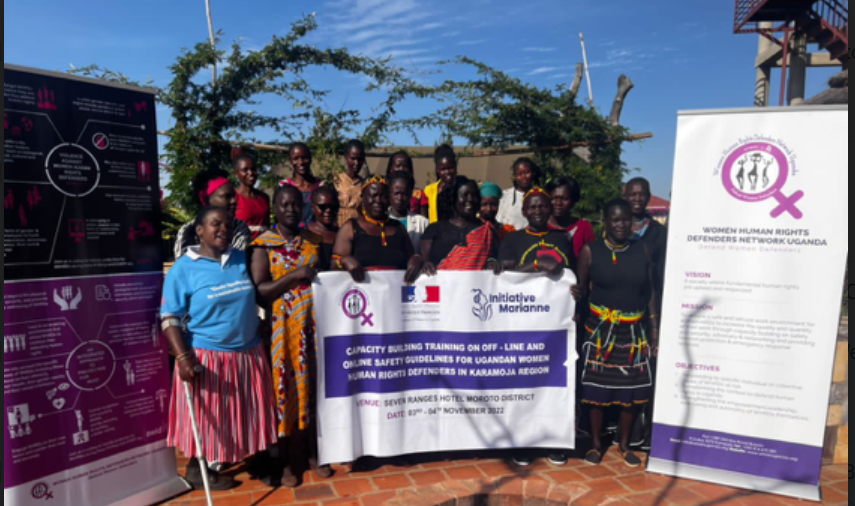In November 2021, UN-WOMEN, UNOHCR (United Human Rights Office of The High Commissioner) and the WHRDN-U (Women Human Rights Defenders Network Uganda), published and launched safety guidelines for WHRDs titled “Our Voices, Our Power: Online and Offline Safety and Security guidelines for Women Human Rights Defenders in Uganda”. The report also called for urgent measures to deal with challenges facing WHRDs including equipping WHRDs with capacities and skills to mitigate the impact of online and offline attacks.
Upon this background, WHRDNU with support from the French Embassy of Uganda, conducted workshop to 20 WHRDs from Karamoja region. The training was conducted on 3rd and 4th November,2022, at Seven ranges hotel, in Moroto district. The two day activity was organized to strengthen the capacity of WHRDs and mitigate the impact of online and offline attacks against WHRDs, provide knowledge on preventing and mitigating gender-based attacks, criminalization of their work, as well as physical and personal security management, offer practical strategies for enhancing WHRD’s safety online & offline as well as provide WHRDS with basic safety tools for WHRDs in preventing and responding to attacks against them.

Remarks from WHRDN-U Secretariat
Ms. Brenda Kugonza of the WHRDN-U started by appreciating the French Embassy in Uganda noting that without their financial support, the training would not have happened. She thanked WHRDs for the good work they do to defend rights in Karamoja region and welcomed them to the training. Brenda then gave details on the objectives of training. She said that training workshop is to increase the knowledge and skills of the participants and their organizations the in relation to off-line and on-line safety guidelines. It would facilitate the spread of information, skills, and culture to prevent and respond to attacks, threats and risks both on-line and off-line by WHRDs. Training workshop was an opportunity to strengthen the capacity of Karamoja WHRDs because they had participated in developing the guidelines during a workshop that was conducted by UNWOMEN, UNOHCHR and WHRDN-U .

Remarks from the district representative
Ms. Betty Nakiru, a female police officer working with Moroto District Child and Family Protection Unit, in her remarks appreciated the WHRDN-U for supporting the work of WHRDS in Karamoja region. She urged participants to report to police when attacked for supporting girls and women the community. If also us the police women are attacked for supporting survivors of domestic violence and what about you. she noted that if women defenders are attacked, then the marginalized people suffer. She ended her remarks by urging them to get her contacts.

Role plays. Types of violence against WHRDs
Joan Namulondo of WHRDN-U, employed the role play methodology f in this session to further help participants understand the concepts. Four (4) scenarios (See below) were role played by participants to identify the online and offline, attacks, and gender-based attacks faced by WHRDs in their region. Reflections and learnings scenarios included:
- Human rights work is risky and the need to prepare to deal with un expected risks, threats, and security incidents.
- Human Rights activities cannot be successful without security measures.
- WHRDs in Karamoja, have suffered the same risks such as those roles played

DAY 2
Digital and social media security management
The purpose of the session was to learn about Digital and Online Security Management. The learnings were imparted when participants mentioned that digital security in relation to smart phones, mobile phones, internet café, phones, cameras, modems, flash discs, emails, watsapp, Facebook, Twitter, Instagram, Tiktok etc. Through a brain storming session, participants learnt some basic computer security measures such as to install antivirus to protect their computers from malware and hackers, to create and maintain secure passwords, have strong different passwords for different services and phone security measures such as the safest mobile phone is a cheap, unregistered, don’t save sensitive information on your phone, make sure all your information is deleted on your mobile before selling it or having it repaired, destroy unusable phones and old sim cards before discarding them.

